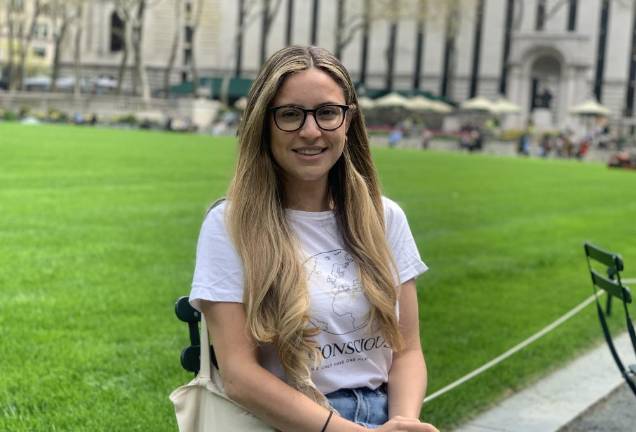Cristina Garcia: A Rising Star of Sustainability
Cristina Garcia, at 31, is assistant director at the Building Electrification Institute

There are one million buildings in New York City, encompassing residential and commercial structures. For Cristina Garcia, they are not only architecture. To her, each one represents a unique opportunity to make the city more sustainable.
At 31 years old, Garcia is already a rising star in New York. In 2021, she was named on City and State’s “40 Under 40” list for New York City. The award recognizes both her work in environmental engineering and her successful efforts to increase minority representation in her field.
A native New Yorker, Garcia’s love for her city and for environmental engineering started early. After growing up in Floral Park, Queens, she briefly attended Syracuse University before feeling the pull of her hometown and transferring to City College. She began her studies as a civil engineering major, until 2006’s most famous documentary film changed her plans.
“My second year, I saw ‘An Inconvenient Truth’ and was like, ‘Holy s—t, this is the most pressing crisis of our time,’” says Garcia. “I wanted to use my engineering skills [to fight climate change], so I completely switched to a full environmental engineering major. It fueled that fire, so much so that even as I was graduating I was like, ‘I still have so much to learn.’”
While working on her capstone senior project, she developed a special interest in New York City buildings. “I realized buildings make up 70% of our greenhouse gases in the city,” she says. “I realized this is exactly where I want to focus my skills, on the building problem in NYC that contributes to greenhouse gases. That was where all the pieces came together.”
This passion led Garcia to a master’s degree in her field, then a two-and-a-half-year stint working in the NYC mayor’s office. There she met others who shared her concern for sustainability in buildings.
Today, she is assistant director at the Building Electrification Institute, where she works to help more and more buildings in New York and several other American cities run on electrical power instead of natural gas.
Central to her focus is an emphasis on equitable solutions. “Climate change impacts us all, but some people more than others,” says Garcia. Marginalized groups such as low-income communities and communities of color have historically been the most burdened by climate change, yet tend to experience far fewer benefits from sustainability efforts. As an added challenge, electrification of a building can be expensive, meaning that low-income residents are far less likely to be able to implement it.
However, where it does succeed, the switch away from natural gas can simultaneously benefit the environment and the residents of the building who implement the change. “The renter would see health benefits, because the air quality is better, but also they would see changes to their utility bills,” she says.
Along the way, Garcia has discovered a related passion: increasing Latinx representation in the environmental engineering field.
“I’m first-generation. My parents are from Colombia,” says Garcia. “My sister and I are definitely a product of the American Dream.” While her parents were supportive of her goals, they were unequipped to help her navigate the educational and career steps necessary to get her where she is today. In addition, there were few Latinx role models in her chosen industry.
To remedy this problem, Garcia started an organization called Latinxs for Sustainability. “[The project] started from a position of wanting to network,” she says. When she started hosting happy hours for Latinx engineers working towards sustainability, she found that all the attendees described being some of the only Latinx people at their companies.
Her focus shifted to trying to increase representation. She points out that in college, she met many people of all races studying sustainability. However, upon entering the working world, the faces she saw around her were largely white and male.
“We’ve been helping [Latinx] people pay for certifications or attending conferences. We know the socioeconomic upbringing can impact your trajectory.” Her goal is to help young Latinx people who study environmental engineering and related subjects take the final step and get into the rooms where decisions are being made.
“Young people aren’t seeing themselves in these rooms,” says Garcia. “That’s why it’s so critical that the few in these rooms, their stories are elevated.”
“Climate change impacts us all, but some people more than others.” Cristina Garcia, assistant director of the Building Electrification Institute